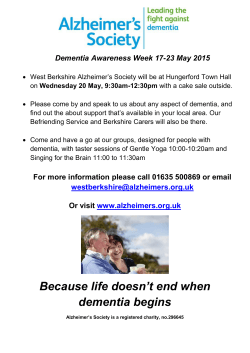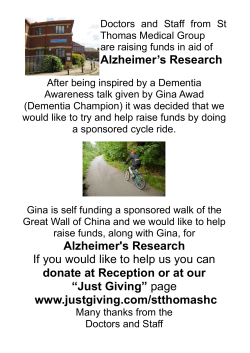
Learn More
Our goal for Dementia Care 2015 is to empower and inspire you on your caregiving journey. We gather experts from the Alzheimer’s Association and Central New York community to guide you on your journey as an Alzheimer’s or dementia caregiver. New for 2015 Repeat Breakouts: We want you to experience as many of the programs as possible. This year, we will repeat our morning presentations in the afternoon so that you will have a greater chance to experience all of our offerings. You choose the topics you want to attend and we will create your morning and afternoon schedule. The $75 registration fee includes all sessions, continental breakfast, lunch, and refreshments during the day. You will also receive a reference book that includes all presentation materials from the day, as well as a guide to local resources. Empowering Caregivers with Practical Solutions A Conference for Central New York Alzheimer’s and Dementia Caregivers May 20, 2015 • 8 a.m.-4 p.m. 441 W. Kirkpatrick St. Syracuse, NY 13204-1305 Our conference planning team created a set of guiding principles when designing this year’s event: • Introduce unpaid and paid caregivers to community resources available for hire, consultation, or other use. • Increase the knowledge base of family and professional caregivers through expert-to-peer or peer-to-peer sessions. • Provide family caregivers practical tactics to employ at home to relieve stress and reduce the rate of caregiver burnout. • Improve the quality of care provided by unpaid and paid caregivers by discussing interventions that can be employed immediately within the care setting. • Improve the quality of life for the person receiving care. DoubleTree by Hilton Hotel Syracuse 6301 State Route 298, East Syracuse, NY 13057 Registration Information Breakout Topics Biographies of each speaker are available at www.alz.org/cny Conference Schedule 8 a.m. Registration Opens 8:30-10:15 a.m. Morning Keynote Expo Area Opens (tables open during all breaks) Continental Breakfast Served Opening Remarks Catherine James, Alzheimer’s Association, Central New York Chapter Chief Executive Officer Keynote Presented by Centers at St. Camillus Finding Hope In Alzheimer’s Disease Jed Levine, Alzheimer’s Association, New York City Chapter Alzheimer’s disease has a physical, mental, and emotional impact on caregivers. What is the hope in Alzheimer’s disease for caregivers? Our keynote will center on validating the caregiver experience, acknowledging the emotional impact of the disease, and addressing challenges of acceptance. 10:30-11:45 a.m. Breakout Session I* 11:45 a.m. Lunch and Expo 1-2:15 p.m. Breakout Session II* 2:30-3:45 p.m. Afternoon Keynote Lunch Presented by Brookdale Senior Living Clare Bridge Manlius Keynote Presented by Centers at St. Camillus Self Care: The Key to Effective Caregiving Gwendolyn Webber-McLeod, Gwen Inc. Caregiving is an act of love, but is also stressful and exhausting. Self care is an important and necessary piece of effective caregiving. Our speaker will offer inspiration and specific strategies that can be used to thrive through the joy and challenge of the caregiving journey. 3:45 p.m. Closing Remarks 4 p.m. Conference Ends * Conference organizers will assign your breakout sessions based on your topic choices at registration. Alzheimer’s and Dementia Behaviors Nutritional Needs for Dementia Alzheimer’s disease and other forms of dementia change how the brain works. As a result, unique behaviors related arise. As the leader in dementia care and education, our staff will discuss how to avoid and diffuse challenging situations. A board-certified specialist in gerontological nutrition will present on how to provide proper nutrition to a person with Alzheimer’s or other dementia, as well as remove challenges related to mealtime. Melinda Sobrado, Associate Program Director, Alzheimer’s Association, Central New York Chapter Chaya Lee Charles, MS, RD, CSG, CDN, Outpatient Dietitian, Sodexho at The Centers at St. Camillus Objectives: Review the relationship between dementia and behavioral difficulties; discuss triggering events (i.e. traveling, loud noises, confusion) and how to reduce their impact on the person with dementia; provide successful methods to intervene and respond to a behavioral event; identify warning signs to prevent behavioral events. Objectives: Discuss the basic nutritional needs of individuals with Alzheimer’s disease or other forms of dementia compared to healthy seniors; explore the impact of other medical conditions on the nutritional needs of a person with Alzheimer’s disease or other dementia; offer practical tips to address eating challenges (i.e. choking, utensil usage) for an individual with dementia. Navigating and Advocating at the Hospital The OTHER Dementias Eileen B. Welch, LMSW, Veterans Administration Medical Center Hospital visits create confusion for both the patient and caregiver. Learn about the admission, observation and discharge processes, how to ensure that best quality of care is provided, and how to avoid hospitalization altogether. Objectives: Review the Patient’s Bill of Rights and how they apply to the individual being hospitalized and their caregiver(s); discuss the difference between admission and observation, and how that affects both the hospital and patient; answer the most frequently asked questions about hospitalization, and arm the caregiver with questions to ask on behalf of the patient; identify warning signs to avoid hospitalization. How to Register Registration for Dementia Care 2015 is $75. To simplify registration for this year’s conference, registrations will only be taken online or by phone. To register online, visit www.alz.org/cny and click the Dementia Care 2015 link. The Chapter accepts VISA, MasterCard, Discover, American Express and PayPal online. The Chapter accepts VISA, MasterCard and Discover by phone. If you wish to pay by check, you must reserve your space by calling and submit payment within five business days. Dr. Andrea I. Berg, M.D., Upstate Medical University Diseases including Frontotemporal dementia (Pick’s disease), dementia with Lewy Bodies, and Parkinson’s disease are becoming more commonly diagnosed by medical professionals. A board-certified geriatrician will compare and contrast the different dementias and discuss each disease’s unique challenges. Objectives: Explain the similarities and differences between common forms of dementia, including vascular dementia, frontotemporal dementia, dementia with Lewy Bodies, and Parkinson’s disease; explore the less common forms of dementia including Huntington’s disease, Wernicke-Korsakoff syndrome, and Creutzfeldt-Jakob disease; review the behavioral and physical challenges presented by other forms of dementia (i.e. tremors and Parkinson’s disease); discuss the treatment methods for individuals with non-Alzheimer’s dementias. To register by phone, call one of the numbers below between 8:30 a.m. and 4:30 p.m. and dial extension 108: • Cayuga County: 315-294-1691 • Cortland: 607-289-4098 • Greater Binghamton area: 607-785-7852 • Greater Syracuse area: 315-472-4201 • Ithaca: 607-330-1647 • Mohawk Valley: 315-617-4025 • Oswego County: 315-596-4016 • St. Lawrence County: 315-621-4025 • Watertown/1000 Islands: 315-782-8755
© Copyright 2025









